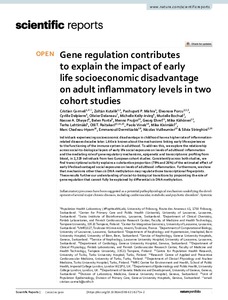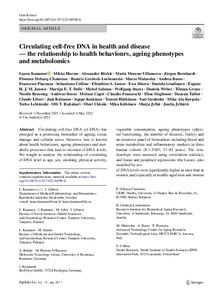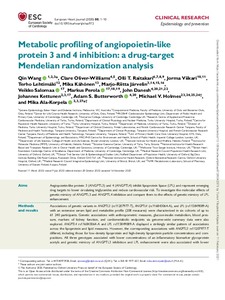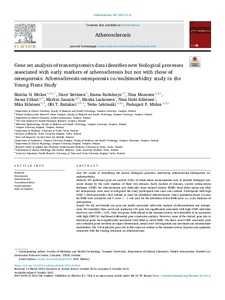Hae
Aineistot 11-20 / 34
Association of lifetime blood pressure with adulthood exercise blood pressure response: the cardiovascular risk in young Finns study
<p>Purpose<br></p><p>Elevated blood pressure (BP) in childhood has been associated with increased adulthood BP. However, BP and its change from childhood to adulthood and the risk of exaggerated adulthood exercise BP ...
Gene regulation contributes to explain the impact of early life socioeconomic disadvantage on adult inflammatory levels in two cohort studies
Individuals experiencing socioeconomic disadvantage in childhood have a higher rate of inflammation-related diseases decades later. Little is known about the mechanisms linking early life experiences to the functioning of ...
Magical thinking in individuals with high polygenic risk for schizophrenia but no non-affective psychoses-a general population study
A strong genetic background for psychoses is well-established. Most individuals with a high genetic risk for schizophrenia, however, do not develop the disorder. We investigated whether individuals, who have a high genetic ...
Influential Periods in Longitudinal Clinical Cardiovascular Health Scores
<p>The prevalence of ideal cardiovascular health (CVH) among adults in the United States is low and decreases with age. Our objective was to identify specific age windows when the loss of CVH accelerates, to ascertain ...
Circulating cell-free DNA in health and disease - the relationship to health behaviours, ageing phenotypes and metabolomics
<p>Circulating cell-free DNA (cf-DNA) has emerged as a promising biomarker of ageing, tissue damage and cellular stress. However, less is known about health behaviours, ageing phenotypes and metabolic processes that lead ...
Genetic loci and prioritization of genes for kidney function decline derived from a meta-analysis of 62 longitudinal genome-wide association studies
<p>Estimated glomerular filtration rate (eGFR) reflects kidney function. Progressive eGFR-decline can lead to kidney failure, necessitating dialysis or transplantation. Hundreds of loci from genome-wide association studies (GWAS) for eGFR help explain population cross section variability. Since the contribution of these or other loci to eGFR-decline remains largely unknown, we derived GWAS for annual eGFR-decline and meta-analyzed 62 longitudinal studies with eGFR assessed twice over time in all 343,339 individuals and in high-risk groups. We also explored different covariate adjustment. Twelve genome-wide significant independent variants for eGFR-decline unadjusted or adjusted for eGFR-baseline (11 novel, one known for this phenotype), including nine variants robustly associated across models were identified. All loci for eGFR-decline were known for cross-sectional eGFR and thus distinguished a subgroup of eGFR loci. Seven of the nine variants showed variant-by-age interaction on eGFR cross section (further about 350,000 individuals), which linked genetic associations for eGFR-decline with age-dependency of genetic cross-section associations. Clinically important were two to four-fold greater genetic effects on eGFR-decline in high-risk subgroups. Five variants associated also with chronic kidney disease progression mapped to genes with functional in-silico evidence (UMOD, SPATA7, GALNTL5, TPPP). An unfavorable versus favorable nine-variant genetic profile showed increased risk odds ratios of 1.35 for kidney failure (95% confidence intervals 1.03-1.77) and 1.27 for acute kidney injury (95% confidence intervals 1.08-1.50) in over 2000 cases each, with matched controls). Thus, we provide a large data resource, genetic loci, and prioritized genes for kidney function decline, which help inform drug development pipelines revealing important insights into the age-dependency of kidney function genetics.</p>...
Metabolic profiling of angiopoietin-like protein 3 and 4 inhibition: a drug-target Mendelian randomization analysis
<p><strong>Aims:</strong> Angiopoietin-like protein 3 (ANGPTL3) and 4 (ANGPTL4) inhibit lipoprotein lipase (LPL) and represent emerging drug targets to lower circulating triglycerides and reduce cardiovascular risk. To ...
Repeatedly Measured Serum Creatinine and Cognitive Performance in Midlife: The Cardiovascular Risk in Young Finns Study
<p><strong>Background and Objectives</strong> Serum creatinine is typically used to assess kidney function. Impaired kidney function and thus high serum creatinine increase the risk of poor cognitive performance. However, ...
Gene set analysis of transcriptomics data identifies new biological processes associated with early markers of atherosclerosis but not with those of osteoporosis: Atherosclerosis-osteoporosis co/multimorbidity study in the Young Finns Study
<p>Aim<br></p><p>We aimed at identifying the shared biological processes underlying atherosclerosis-osteoporosis co/multimorbidity.</p><p>Methods</p><p>We performed gene set analysis (GSA) of whole-blood transcriptomic ...
Methylation status of nc886 epiallele reflects periconceptional conditions and is associated with glucose metabolism through nc886 RNAs
<p>Background</p><p>Non-coding RNA 886 (nc886) is coded from a maternally inherited metastable epiallele. We set out to investigate the determinants and dynamics of the methylation pattern at the nc886 epiallele and how ...








